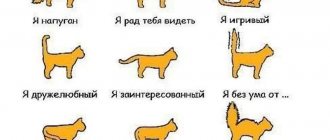Cat brain structure
The structure of a cat's brain is similar to a human's. It also consists of three lobes - temporal, parietal and occipital, gray and white matter. The parameters are also similar - the neural connection provides five standard responses. Although this organ is at least two times smaller in size.
The weight of a cat's brain is about 1% of its body weight, in a dog - 1.2, in a person - 2, which in no way indicates a similar comparison of the level of intelligence.
The cerebral cortex and the number of neurons are responsible for higher brain activity. A person has 10 billion, a cat has 300 million, and a dog has 160.
Each neural impulse involves specific areas of the brain that store their information.
This concludes the studied area. Scientists can only guess how a cat's memory works.
Features of memory in cats and kittens
A cat's brain is much smaller than a human's - its weight is only 1% of body weight, while a person's is 2%. But at the same time, it is similar to our brain: it also consists of neurons that form gray and white matter, is divided into frontal, temporal, parietal and occipital lobes, and the cortex is covered with convolutions, although more primitive than those of humans.
The cat's brain has a similar structure to the human brain, and the same parts of it are responsible for emotions and memory.
Scientists have long been interested in the peculiarities of cat memory. Back in the 70s of the last century, experiments were conducted on this topic. Hungry cats were shown food, then bowls were hidden in front of them under different boxes and the subjects were removed from the room. After half an hour, the cats were returned and their behavior was observed. Almost all the cats immediately ran to the right boxes and found bowls of food underneath them. However, when the experiment was extended to a day, the situation changed. During the day, the cats clearly forgot the details of the situation. Some of them showed no interest in the boxes at all, while others sniffed all the boxes in a row. That is, some cats retained memories, but they were vague.
Cats are especially good at remembering anything related to food, as this topic is vital in the wild.
A more recent experiment appears in the journal Behavioral Processes. Japanese scientists studied episodic memory in cats. This is a memory that is associated with certain events and situations. In the first part of the experiment, cats were asked to examine four bowls of food, but were only allowed to try from two bowls. Then the cats were taken out of the room for a quarter of an hour, after which they were returned, replacing all the bowls with the same empty ones, but maintaining their location. The animals were more attracted to those bowls from which they had not yet eaten. And they clearly remembered their location. In the second part of the experiment, the conditions became more complicated. Only two of the four bowls contained tasty food, one contained an inedible item, and the fourth bowl was empty. The cats were allowed to explore all the bowls and eat food from one, then they were removed from the room and returned after a while. The subjects showed interest primarily in the second remaining bowl of food, that is, they remembered the circumstances of the situation. As a result, scientists concluded that cats have episodic memory, and in the first part of the experiment, the cats remembered where the food was, and in the second, what exactly was in different places.
Without a good memory, cats would not be able to manipulate human objects, such as front doors and furniture doors.
Thus, the development of short-term and episodic memory in cats has been confirmed experimentally. And in fact, how would cats learn and master new forms of behavior without a good memory? But cats can even be trained. Proof of this are the performances of the famous Kuklachev Theater. And at home, you can teach your cat to understand certain words and follow commands: cat owners often share similar experiences on the Internet.
Many cats are excellent at carrying human objects in their teeth and can be trained to bring a newspaper or slippers to their owner.
However, cat memory has its own characteristics. Cats remember best what is important to them or is colored with vivid emotions. This property of memory can be called selectivity. Only information necessary for the safe existence of cats is remembered. In the wild, memory helps cats change their behavior in time, adapting to the situation, and survive. Therefore, they perfectly remember places where there is food or water, warm shelter, enemies or dangerous objects, but they immediately forget minor information. Memories arise involuntarily, by association with a certain picture, sounds, smells, tactile sensations, and cats cannot retrieve information from memory voluntarily, like humans.
A cat gets most of its information from observation. Kittens learn everything by watching their mother. Pets remember people's actions (for example, how people open the door) and try to repeat them. Cats learn just as easily by repeating actions one after another. In some studies, the most resourceful cat was successful in obtaining food, and then the other cats copied its actions.
Longevity: how long do cats remember certain events and their owner?
As a result of the experiments, scientists approximately determined the time during which cats retain memories - about 16 hours. This is a characteristic of their short-term memory. But cats only remember information that is important to them so well. For example, a cat will remember well a guest who accidentally stepped on his tail or fed the cat a tasty treat. He will forget guests who did not have direct contact with him in a few minutes.
With long-term memory everything is more complicated. The fact is that it is closely intertwined with instincts, which, in essence, are the innate memory of the animal. Certain rituals during hunting, communicating with relatives, and caring for offspring are determined precisely by instincts. But, for example, a cat gets better at caring for kittens with each new litter. That is, she accumulates useful experience and this information remains with her forever.
But in nature, animals do not have owners, and this means that cats demonstrate excellent long-term memory, and not instincts, regarding their loved ones. There are numerous cases where cats have found their home and their owners several months or years after they were lost.
Cats remember best the people who raised them from childhood.
The cat Barsik from the Rostov region disappeared during a trip with his owners to Lugansk to visit relatives and returned to his home 2 months later, having traveled about 200 km. A cat from France named Mumusu got lost in a similar situation, but much further from home - over 750 km. However, Mumusu also returned home, and his journey took a whole year. The Murmansk cat Semyon broke all records. He walked to his hometown from Moscow for 6 years and covered 2 thousand km.
The monument to Semyon symbolizes all the devoted cats and kittens who returned home through time and distance
There are a lot of such cases known. True, skeptics argue that the cat becomes more attached not to the owner, but to the house. But, for example, the cat Sam from the UK, although he could not return home on his own, did not forget his owner even after 5 years of wandering life. When he was caught, the chip was counted, and his owner came for him, Sam immediately recognized him and joyfully rushed to meet him. Cat owners describe many similar stories in which the pet recognized the owner and showed warm feelings towards him several years after parting.
Memorization speed: how to train your pet so that he remembers everything
Cats are able to remember information the first time if it is interesting or vital. Moreover, cats' memory has a pronounced edge effect: animals best remember the first impression that a person or situation made on them. This should be taken into account when meeting your future pet for the first time. It’s interesting that the first time any kitten sees itself in the mirror, it gets scared and rears up. But, after communicating with the reflection for two or three days, he realizes that it is harmless, and for the rest of his life he does not pay attention to it.
Cats quickly understand that their reflection is safe, and dogs bark at it every time, mistaking it for a rival.
If a cat needs to be taught something that is not of particular interest to it, then the lessons will have to be repeated five times or more. The main rules for successful training: interest the pet, if possible, use its hunting instincts and be sure to reward for the slightest success (with praise or a treat). Punishments when training cats are ineffective and only destroy the cat's trust and love for humans. Repeating lessons daily will improve the quality of learning.
My Bengal cat remembers information that is significant to him in about three times. We sometimes take him outside for a walk, before doing so we put on a harness and place him in a plastic carrier with a door. The first two times the cat refused to wear a harness and lay down on the floor, and had to be pushed into the carrier in the literal sense of the word. But he really enjoyed the walk and on the street he did not pay attention to the harness. The walk became his longed-for dream. By the fourth time, he no longer resisted putting on the harness and willingly entered the carrier. And from the fifth time to this day, he lies patiently while we put on the harness, and then he runs into the corridor and climbs into the carrier. He also closes the door behind him with his paw. If a walk is not expected, but the carrier is in the hallway, then a sad cat sits in it and waits to be taken for a walk. Three more times he remembered that the boxes that couriers bring to our house may contain food and other interesting and tasty things for cats. Before this, he was afraid of couriers and hid under the sofa. But just then, couriers from online stores for animals came to us, and there were always treats in the boxes for him. The cat came out to the fourth courier and sniffed him and the box. Since then, he has met all the couriers and has a very positive attitude towards them, although there is often nothing tasty for him in the boxes.
Capacity: how much information a cat can remember
Unfortunately, researchers have not yet been able to measure the volume of a cat's memory. Much depends on the level of intelligence of each animal. But in general, it is assumed that cats can remember a limited amount of information, especially compared to humans. But a powerful cat memory filter cuts off everything unnecessary, leaving only the most important. Therefore, they can easily remember where the bowl and tray are and where the food is stored, what time the owner returns home, etc. This person remembers many minor facts and details. But cats simply don’t need them.
The ability of cats to learn and solve spatial puzzles indicates that many of them have a well-developed memory. For example, cats are great at finding their way out of intricate labyrinths, and when preparing for a hunt they even plan their actions!
Interestingly, cats cannot count at all. Trainers have never been able to do a show with a cat-mathematician, while dogs have been performing in this capacity for a long time. But a mother cat will immediately notice the loss of one of her kittens, because the overall picture of what is happening in her mind will become incorrect: it will lack the presence and smell of a specific cub. In the same way, a cat will sense the loss of a family member or a rearrangement of furniture in the apartment.
The cat cannot count her cubs, so after dragging everyone one by one to a new shelter, she returns to the old place to make sure there are no kittens there
Other Features
Kittens should be introduced to people between 2 and 8 weeks, then they will be sociable and tame. They need to be picked up, petted, played with, and accustomed to unpleasant procedures such as trimming their nails or cleaning their ears. If a cat spent its childhood without people, it will be wild and timid. Therefore, wild relatives of cats (ocelot, puma, lynx) are taken into the house for taming only in childhood.
It is also better to accustom a kitten to the litter box and scratching post from a very young age, then he will perceive these rules as immutable
Long-term and short-term memory
A well-known experiment conducted by neurospecialist researchers is very indicative.
Yuri Kuklachev with his cat
The animals were shown tasty food and hidden. The cat retained the memory of this factor for 16 hours, and the dog for only 5. This suggested that cats have good short-term memory, at least much better than dogs. Apparently, the cat remembers certain events or people selectively, but can store these memories for a very long time.
It has been established that the most vivid memories are formed in kittens between 2 and 7 weeks of age. That is why at this time it is recommended to persistently socialize them, accustom them to hands, a name, a litter box, a scratching post, and a harness. But the way a cat forms the information that it needs to store is most likely different from that of a human.
The animal somehow evaluates its significance and “puts into a cell” only what it considers important. She will remember the person who was kind to her, but the indifferent “smell” will immediately be erased from her memory.
But negative events can also be stored in the pet’s memory for a very long time. Resentment or physical pain can make a certain person his worst enemy for a very long time, if not forever.
Cats also quickly remember where delicious food is stored and can jump out of a sweet dream and run to the kitchen at the sound of the refrigerator door opening.
At the same time, scientists have not been able to find out how much information a cat’s brain can store. It is generally accepted that the animal somehow processes information, discarding everything “unnecessary”, and retains only facts and events that are important to it. Moreover, it also remembers this only when it considers it necessary or when it encounters it at the next moment of its life.
The human brain stores a large amount of information and accesses it at any time at will. Cats, apparently, do not have such an ability, just as they do not have regrets, dreams, or memories.
How does a cat remember?
Selectivity is the main difference in cat memory.
The animal constantly “keeps” in its head only what helps it survive.
The pet's ability to retain information is small, so it uses it skillfully. All information that is unimportant for existence and does not help to survive is quickly ignored. But what is important remains in the cat for a long time, and at the sight of this vital thing it is instantly removed. It is typical for a cat to live in this moment, without looking back at the past. That is why, when they become big, kittens may not even recognize their mother in an unfamiliar cat.
Mr. Cat Recommends: Cats' Learning Ability
But cats also have genetic memory. It is guided by it that animals swim, hunt, give birth and feed their offspring. And after the kittens become independent, the female seems to forget about her purpose. Until the next birth and the next offspring.
At the same time, pets perfectly remember the daily routine of the household. They know exactly who will come and what time. And they wait for their beloved owner, sitting on the window or near the front door. The same internal mechanism causes cats to go to the bowl and ask for food at the same time.
It can be assumed that, as in human life, observation and learning play an important role in cats. After all, it is from the mother that kittens learn the skills of using a litter box, eating solid food, and the ability to take care of themselves.
It has been noted that if you persistently work with cats, especially from an early age, they can easily be taught certain skills and abilities. Most likely, these pets are much smarter than is commonly believed. And if they don’t know something, it’s not because they’re unable to learn something new, but precisely because they don’t want to comprehend it.
If the short-term memory of a cat was assessed in comparison with a dog, then the visual memory was compared with monkeys. And they found out that it is no worse than that of primates.
Memory
Animals immediately forget minor information and, unlike humans, do not store in their memory what is not important for a prosperous existence.
For wild cats, which lead a predominantly solitary lifestyle, such an adaptation mechanism is of great importance. Instincts and memory. Scientists have repeatedly tried to answer the question about the capacity of a cat's memory. However, it is not possible to separate such complex mental functions as perception, memory and learning from instincts. Innate elements of behavior in mammals are inextricably linked with life experience, so it is impossible to say with certainty which actions the mustached-striped one has learned from memory and which it performs at the behest of instinct.
It would be more correct to think that with experience the polishing of genetically embedded knowledge and stable memorization of information occurs:
- hunting rituals are based on the instinct of a predator, but luck is honed through training with each new attempt;
- the algorithm for communicating with relatives is confirmed by socialization;
- caring for offspring is based on parental instinct, but with each lambing, the mother cat acquires practical skills and dexterity.
Trainers believe that cats cannot count, since no one has yet managed to put on a show with a tailed mathematician. However, the mother cat instantly detects the shortage of kittens, “comparing” the current picture with the familiar one and imprinted in memory. This “absence effect” allows cats to sense the departure of one of the family members or a change in the interior of the apartment.
Memory and sensitivity. Undoubtedly, the mental activity of cats is much poorer than that of humans, and their memory capacity is less.
It has been established that cats can retain in long-term memory and subsequently recognize only a few individuals or places. At the same time, the reliability of information storage is quite high and allows cats to perform truly fantastic actions.
For example, there are widespread cases of cats returning to their previous place of residence despite the distance. In Murmansk, they even decided to erect a monument to a local celebrity: a traveling cat named Semyon returned home from Moscow, having covered 2,000 kilometers in 6.5 years.
The most susceptible age of a kitten is considered to be from 2 to 8 weeks, when intensive formation of brain structures occurs along with body growth.
If the baby has not seen people or had contact with them during the specified period, then it will be difficult to tame him later. It is on the sensitivity of the psyche that the process of domestication of young jungle cats, ocelots and cheetahs is based.
Memory and aging
As people age, their cognitive abilities also decline. Memory loses its sharpness, some events do not want to be remembered, some, on the contrary, come to the fore.
The same thing happens with cats. Therefore, elderly pets must be treated very carefully. And don’t scold them if they suddenly forget where the litter tray is.
We especially need to take care of walking individuals. Seniors can easily become lost and lost, disoriented in space.
Thus, a cat's memory is very similar to a human's. Its most acute active period occurs in young years, and with age it becomes dull.
How long does a cat remember?
How long does a cat's memory last? This period depends on the importance of the knowledge being stored. A simple example: a cat will instantly forget a guest who visited the owner’s house if he could not have any influence on the animal’s mood
But for all the remaining years, the cat will clearly remember the smell of a stranger who either greatly offended her, frightened her, or was very affectionate with her and treated her to her favorite treat.
Memory in cats, as already mentioned, is selective. The animal will remember for a long time the place where the tray is, or the sound with which the refrigerator door opens
The reason for this is simple: it considers this information important to itself.
Interesting Facts
The memory of cats can be called a unique and completely unstudied phenomenon, if we list at least some of the cases of pets returning home.
A family that traveled from the Rostov region to Lugansk to visit relatives lost their cat Barsik, who was afraid of the dog in the new house.
A little more than a month passed, and the fugitive returned to his home, having covered a distance of more than 200 km.
A similar story happened in 1963 with the French cat Mumusu. They also took him with them to stay and lost him. The pet returned home almost a year later, having traveled 750 km.
The English cat Mack, although he did not find his home on his own, did not forget his owner even after 6 years of his ordeal. He disappeared while traveling through the canals. Volunteers identified the pet after a long time using its chip and returned it to its home. Mac happily rushed to his beloved owner.
But the most unique case happened with the cat Semyon, to whom a monument was erected even in 2013 in Murmansk. He walked from Moscow to his hometown for 6 years, covering more than 2 thousand km. And he arrived safe and sound, but very thin. And even though bronze Semyon does not look like a slender Siamese, it is not even a monument to a pet, but to his love, devotion and memory.
“The years passed. The storm is a rebellious gust..."
But will the cat remember the person in a year? Here it all depends on how big a role your pet has assigned to you in his life. Cats' memory for people is selective and records only what is vital for the animal - both with a plus and a minus sign.
For example, the owners of one mustachioed dog, who had undergone some very unpleasant procedures at the veterinary clinic, a year later invited Aibolit, who treated the pet, to their home. Over the past period of time, the doctor and the patient have never seen each other. And it was very funny for everyone to watch how, upon seeing the “offender,” the cat, on its belly, tried to quietly leave the corridor where, according to tradition, it had gone out to greet the guest.
And another cat, fed from a nipple by a teenage boy, immediately recognized his savior in the brave soldier who had returned from the army. The cat's joy, they say, knew no bounds, although two years have passed since the separation.
Love or habit
There are still ongoing debates about whether cats love their owners or whether they are simply comfortable living under protection and not bothering themselves with getting food. These animals are so independent that it is sometimes difficult to understand from their behavior whether cats recognize their owners.
However, almost all cat owners see their free-loving animal greeting them from work. Of course, each cat has its own temperament: one runs to its owner as fast as it can, while the other opens its eyes slightly and lazily purrs.
We can say that the animal rejoices not at the arrival of people, but at the prospect of a quick tasty meal. Although cats get food without any additional effort on their part.
When the owners are remembered...
There are also very exceptional cases. In one family, during a divorce, the cat stayed with the man, and the woman and children moved to another apartment, half an hour’s drive from their previous home. Some time later the owner died.
Imagine the surprise of the first owner when, a few weeks after the death of her ex-husband, she found a pet at her door. In this case, the cat found the people, not the house. Of course, the question of whether cats remember their owners is not worth it in this case.
Quite often, cats do not find their way home, but return because they remember the people who cared for them. One silly girl ran away in the yard, frightened by a passing car. Several months of active search yielded no results - the owners despaired of finding their favorite. But one day the cat itself saw its owner at a bus stop several blocks from the house and rushed to her with loud screams.
Another timid pussy escaped from the owner's hands in someone else's entrance and seemed to disappear into thin air - it was not possible to catch it. But when, a month and a half later, her owners came to visit this house again, she, hearing her family’s voices, ran out of the basement to meet her “relatives.”
Out of sight, out of mind?
But it also happens differently. It seems that the cat was kindly treated by the person and even felt sad for him at first, but years later he pretends that he doesn’t know him. “Pulking!” - people think, attributing human feelings to a cat.
In fact, over the past time, another owner has taken on the role of breadwinner, drinker and protector, and the animal’s memory has erased unnecessary information about what happened before. The returning cat will take him back to his place - and after a while he will get used to him again.
Let’s make a reservation once again - these rules apply to most cats, but each case is individual. In general, when getting an animal, you need to understand the full extent of the responsibility that you take on, and try to avoid situations that can result in enormous stress for both of you. As they say, don’t part with your loved ones!
Svetlana Mosolova
Cats are mysterious creatures. If everything is clear about their internal structure, then such an abstract concept as memory raises many questions among people. Do they have such a property? What kind of memory do cats have? How does it work? How many days, months or years is it designed for? How many events and people can a cat remember? Can she forget her home and owner after a long separation?
Where's the food? I remember!
The first showed that cats have very good short-term memory. At least, cats keep the place where the treat is hidden in their memory for up to 16 hours. According to this indicator, our favorites surpassed even orangutans!
How good long-term memory is in cats is a question that remains unanswered. Scientists have not been able to find out anything concrete in this regard, and every cat lover has his own opinion on this matter. Someone's cat, once painfully punished in childhood, will be afraid of any slippers for the rest of its life, and another will forget even the owners who went to the dacha in a week.











